Cllr David Simmonds on will the Juncker investment package deliver for Europe?

The announcement by Jean-Claude Juncker of his new investment package, EFSI, has reinvigorated the debate about the role of government in financing public services. Following the European Parliamentary elections earlier this year, new politicians and commissioners taking their seats in Brussels are looking at a European landscape where the economic situation is moribund, with high levels of public and private debt and a lack of growth. Economists will distinguish between the situations in different member states, with some like the UK showing signs of growth in the private sector, and others like Germany continuing to see stable costs of sovereign debt. Regardless of the national circumstances, the need to get the European economy going again is of importance to all. The risk of stagnation and Eurozone deflation poses a risk to the economies of nations not in the zone, and the development of a functional single market requires a levelling up of the economic playing field. The issue of immigration, such a significant factor in the European elections, is a publicly visible symptom of this issue - a single market with free movement of people naturally leads to economic migration, but for many people, opportunities close to home would be preferable. So the question is, will the Juncker package deliver for Europe?
The first challenge is likely to be moving the debate to a shared understanding of what we mean by 'investment' after decades of left-wing politicians describing all forms of public spending as 'investment'. By prioritising infrastructure, Juncker clearly buys the argument that putting money into public works generates private profit that can then be taxed, bringing about a real return to the taxpayer who currently faces huge levels of government debt. The practical reality of this will require a rigorous business-like approach to project funding and the decision to make the fund one that seeks to lever in private finance is helpful provided governments do not subsequently underwrite the risks associated with the projects. Nationalising the debt and risk is essentially just socialist redistribution by another name and financially disastrous, as many EU Member States' economies are currently finding having pursued this line for financing many activities already.
The second challenge is going to be ensuring that as the project pipeline develops and the assistance programme kicks in, that we do not fall into the trap of seeing EFSI as an extra-national subsidy for unviable national projects. Good intentions at EU level risk being translated at national, regional or local level into seeing EFSI as simply an alternative source of borrowing that will ultimately fall to the taxpayer rather than generating a real return. Ensuring that the bureaucracy around the funds does not lead into a confusion of red tape where profits are made by accountants, consultants and lawyers at the expense of taxpayers but no-one else is key.
Europe remains the largest and wealthiest economic bloc in the work. The risk is that in the absence of growth, we fall to taxing diminishing wealth in order to prop up unsustainable levels of public spending. This short term solution, so favoured by the left, is inevitably doomed - as the saying goes, 'the trouble with socialism is that eventually you run out of someone else's money'. With the Juncker plan due to be in action by 2015, we need to ensure that it is based on sound finances.

